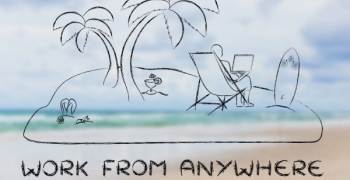Technology Services and its Changing Role During the COVID Era

The world has undergone a seismic shift in the past one month. Almost overnight, the needs of organizations and workforces have changed drastically. Who would have predicted even in late 2019 that a large part of the world would be under voluntary lockdown? It is true that the trend of remote working had been steadily increasing in the last few years, but Covid-19 has precipitated the situation like never before, both in India and around the globe.
To adapt to this unprecedented situation, more and more businesses globally are adopting the concept of “home office” and employees are taking to work remotely.
For engineering services companies that are historically used to working on customer sites or in R&D Labs, working from home is an altogether new trend, and the industry had to take into consideration multiple aspects of sensitivities while migrating to the new normal.
With innovation being a general pursuit for technology services firms, R&D assumes prime importance in the overall scheme of things. Thus, the first step towards moving to a WFH environment would require virtualizing the R&D experience - not an easy thing to do as R&D has been traditionally done in controlled settings. Creation of what we call as “home-labs” with the requisite hardware infrastructure and workstations will ensure that critical projects are not disrupted. Companies have already started talking about virtualizing embedded work for select customers with backup power systems and office workstations supplied to engineers at home.
The second factor can also be viewed as a new opportunity. Bringing the R&D lab experience to the customer’s home. Digital clones can be created of labs which are then showcased to customers by taking them through a virtual walkthrough. This gives customers an idea about the host company’s competency and unique differentiators without them having to even step out of the door.
The third factor is of course security & safety, especially of systems, infrastructure and data. Encrypted hard-disks (where essential), securing and monitoring ports and access through VPN are some of the necessary steps. Data protection is a must in today’s uncertain times when cybercrime is on the rise. Of course, basic rules have to be religiously followed, which include mandatory NDA declaration by employees, changing passwords periodically, regular software upgrades and avoiding doing personal work or sharing personal information through company enabled workstations.
Lastly, I come to the fourth factor, which is that the current situation of extreme WFH migration not just in India but spanning all geographical continents has made the senior leadership of organizations in the U.S. and Europe, sit up and take notice! Overseas companies are now realizing the benefits offered by migrating the work from onsite to offshore and gain the resultant cost arbitrage with no impact on quality. Many overseas companies who are poised to bounce back once the COVID pandemic fades, are exploring if this is a trend that can be leveraged to get more output from reduced budgets. Extreme offshoring appears to be a likely outcome of this consideration.
Free time or unwinding breaks should be spent in using tech to build an atmosphere of camaraderie while sitting in one’s own room. Planning virtual coffee breaks, happy hours, participating in online karaoke sessions are some of the fun ways to let one’s hair down. Virtual games through new apps like Psych are being used by teams to unwind & play games jointly from home. These are perks that one has earned!
Staying indoors for a while in the grand scheme of things, is a small price to pay to ensure safety for all. No doubt, technology is both an enabler and a savior in these turbulent times, by successfully connecting people across the globe and allowing people to undertake complex projects from the comfort of their armchair. Since ‘virtual’ is the new normal, get imaginative on how you work, how you stay in touch and use technology to make this unique experience also a memorable one.
*First published in Economic Times on May 1, 2020.






